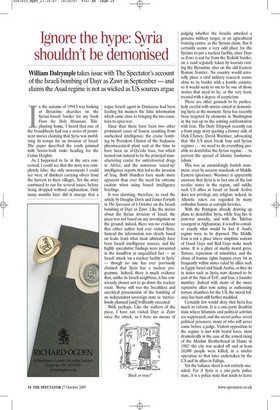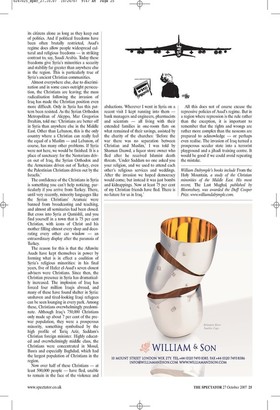Ignore the hype: Syria shouldn't be demonised
William Dalrymple takes issue with The Spectator's account of the Israeli bombing of Dayr as Zawr in September — and claims the Asad regime is not as wicked as US sources argue 1 n the autumn of 1994 I was looking at Byzantine churches on the Syrian-Israeli border for my book From the Holy Mountain. Telephoning home, I heard that one of the broadsheets had run a series of prominent stories claiming that Syria was mobilising its troops for an invasion of Israel. The paper described the roads jammed with Soviet-built tanks heading for the Golan Heights.
As I happened to be in the area concerned, I could see that the story was completely false: the only movements I could see were of donkeys carrying olives from the harvest to their villages. Yet the story continued to run for several issues, before being dropped without explanation. Only many months later did it emerge that a rogue Israeli agent in Damascus had been feeding his masters the false information which came close to bringing the two countries to open war.
Since then there have been two other prominent cases of fiascos resulting from unchecked intelligence: the cruise bombing by President Clinton of the Sudanese pharmaceutical plant said at the time to have been an al-Qa'eda base, but which turned out instead to be the principal manufacturing centre for antiretroviral drugs in Africa; and the notorious 'sexed-up' intelligence reports that led to the invasion of Iraq. Both blunders have made more apparent than ever the need for extreme caution when using biased intelligence briefings.
It was alarming, therefore, to read the article by Douglas Davis and James Forsyth in The Spectator of 6 October on the Israeli bombing of Dayr as Zawr. Like the stories about the Syrian invasion of Israel, the piece was not based on any investigation on the ground; indeed, there was no evidence that either author had ever visited Syria. Instead the information was clearly based on leaks from what must ultimately have been Israeli intelligence sources, and the highly speculative findings were presented in the standfirst as unqualified fact — an Israeli attack 'on a nuclear facility in Syria' — though no one has ever previously claimed that Syria has a nuclear programme. Indeed, there is much evidence that, unlike its Israeli neighbour, it has consciously chosen not to go down the nuclear route. Worse still was the breathless and uncritical presentation of the bombing of an independent sovereign state as 'meticulously planned [and] brilliantly executed.'
Well, perhaps. Like the authors of the piece, I have not visited Dayr as Zawr since the attack, so I have no means of judging whether the Israelis attacked a genuine military target, or an agricultural training centre, as the Syrians claim. But it certainly seems a very odd place for the Syrians to put a nuclear facility, since Dayr as Zawr is not far from the Turkish border, on a road regularly taken by tourists visiting the Byzantine sites on the old Eastern Roman frontier. No country would naturally place a vital military research centre close to its border with a hostile country, so it would seem to me to be one of those stories that need to be, at the very least, treated with a degree of scepticism.
There are other grounds to be particularly careful with stories aimed at demonising Syria at the moment. Syria has recently been targeted by elements in Washington in the run-up to the coming confrontation with Iran. The Daily Telegraph recently ran a front-page story quoting a former aide of Dick Cheney, David Wurmser, advocating that 'the US must break Iran and Syrian regimes. . . we need to do everything possible to destabilise the Syrian regime. . . to prevent the spread of Islamic fundamentalism.'
This was an astonishingly foolish statement, even by neocon standards of Middle Eastern ignorance. Wurmser is apparently unaware that Syria is in fact one of the last secular states in the region, and unlike such US allies as Israel or Saudi Arabia does not privilege any religion; indeed, its Allawite rulers are regarded by many orthodox Sunnis as outright heretics.
With the Pentagon already drawing up plans to destabilise Syria, while Iraq lies in post-war anarchy, and with the Taleban resurgent in Afghanistan, it is well to consider exactly what would be lost if Asad's regime were to be deposed. The Middle East is not a place where simplistic notions of Good Guys and Bad Guys make much sense. It is a place of murky moral greys. Torture, repression of minorities, and the abuse of human rights happen every bit as frequently within states ruled by allies such as Egypt, Israel and Saudi Arabia, as they do in states such as Syria, now deemed to be part of the Axis of Evil', and Iran, a founder member. Indeed with many of the more repressive allies now acting as outhousing torture chambers for the US, the moral balance has been still further muddied.
Certainly few would deny that Syria has much to reform. It is a one-party Baathist state where Islamists and political activists are suppressed, and the secret police arrest political prisoners, many of who will never come before a judge. Violent opposition to the regime is met with brutal force, most dramatically in the case of the armed rising of the Muslim Brotherhood in Hama in 1982: the city was sealed off and at least 10,000 people were killed, in a similar operation to that later undertaken by the US and its allies in Falluja.
Yet the balance sheet is not entirely onesided. For if Syria is a one-party police state, it is a police state that tends to leave its citizens alone as long as they keep out of politics. And if political freedoms have been often brutally restricted, Asad's regime does allow people widespread cultural and religious freedoms — in striking contrast to, say, Saudi Arabia. Today these freedoms give Syria's minorities a security and stability far greater than anywhere else in the region. This is particularly true of Syria's ancient Christian communities.
Almost everywhere else, due to discrimination and in some cases outright persecution, the Christians are leaving; the mass radicalisation following the invasion of Iraq has made the Christian position even more difficult. Only in Syria has this pattern been resisted. As the Syrian Orthodox Metropolitan of Aleppo, Mar Gregorios Ibrahim, told me: 'Christians are better off in Syria than anywhere else in the Middle East. Other than Lebanon, this is the only country where a Christian can really feel the equal of a Muslim — and Lebanon, of course, has many other problems. If Syria were not here, we would be finished. It is a place of sanctuary: for the Nestorians driven out of Iraq, the Syrian Orthodox and the Armenians driven out of Turkey, even the Palestinian Christians driven out by the Israelis.'
The confidence of the Christians in Syria is something you can't help noticing, particularly if you arrive from Turkey. There, until very recently, minority languages like the Syrian Christians' Aramaic were banned from broadcasting and teaching, and almost all seminaries had been closed. But cross into Syria at Qamishli, and you find yourself in a town that is 75 per cent Christian, with icons of Christ and his mother filling almost every shop and decorating every other car window — an extraordinary display after the paranoia of Turkey.
The reason for this is that the Allawite Asads have kept themselves in power by forming what is in effect a coalition of Syria's religious minorities: in his final years, five of Hafez el-Asad's seven closest advisers were Christians. Since then, the Christian presence in Syria has dramatically increased. The implosion of Iraq has forced four million Iraqis abroad, and many of these have found shelter in Syria: unshaven and tired-looking Iraqi refugees can be seen lounging in every park. Among these, Christians overwhelmingly predominate. Although Iraq's 750,000 Christians only made up about 7 per cent of the prewar population, they were a prosperous minority, something symbolised by the high profile of Tariq Aziz, Saddam's Christian foreign minister Highly educated and overwhelmingly middle class, the Christians were concentrated in Mosul, Basra and especially Baghdad, which had the largest population of Christians in the region.
Now over half of these Christians — at least 500,000 people — have fled, unable to remain in the face of the violence and abductions. Wherever I went in Syria on a recent visit I kept running into them — bank managers and engineers, pharmacists and scientists — all living with their extended families in one-room flats on what remained of their savings, assisted by the charity of the churches: 'Before the war there was no separation between Christian and Muslim,' I was told by Shamun Daawd, a liquor store owner who fled after he received Islamist death threats. 'Under Saddam no one asked you your religion, and we used to attend each other's religious services and weddings. After the invasion we hoped democracy would come; but instead it was just bombs and kidnappings. Now at least 75 per cent of my Christian friends have fled. There is no future for us in Iraq.'
All this does not of course excuse the repressive policies of Asad's regime. But in a region where repression is the rule rather than the exception, it is important to remember that the rights and wrongs are rather more complex than the neocons are prepared to acknowledge — or perhaps even realise. The invasion of Iraq turned a prosperous secular state into a terrorist playground and a jihadi training centre. It would be good if we could avoid repeating the mistake.
William Dahymple's books include From the Holy Mountain, a study of the Christian minorities of the Middle East. His most recent, The Last Mughal, published by Bloomsbury, was awarded the Duff Cooper Prize. www.williamdahymple.com.



































































 Previous page
Previous page